

Legal director | Grupo Punta Cana



Yudith Castillo
Legal director | Grupo Punta Cana
How do you approach managing legal aspects during periods of instability or crises, and how does your legal strategy align with the broader business strategy to ensure the organisation’s resilience?
Periods of instability, such as during the COVID-19 pandemic, require strategic thinking. We revisit fundamental legal principles and engage in brainstorming and benchmarking with colleagues and business organisations. This approach helps us create agile, legally sound solutions that preserve business competitiveness and support the productive sector and the country during challenges. Personally, I believe that crises provide opportunities to unlearn and relearn, strengthen emotional intelligence, become more empathetic, and stay aligned with the organisation’s strategy. This enables us to manage and overcome the situation, transforming the crisis into an opportunity. The company should look to its legal team for creative, sustainable solutions. Lawyers must immerse themselves in the legislative intent behind existing laws and, where necessary, help develop new norms that challenge the status quo and drive innovation.
What are the main cases or transactions you have been involved in recently?
Our key achievements include strategic alliances in tourism and real estate markets, as well as ventures that enhance the competitiveness of the sector both locally and internationally. These initiatives, supported by contractual and corporate agreements, have been publicly announced by the company’s senior management. We have also actively participated with business organisations in evaluating and issuing position papers on significant legislative and regulatory initiatives.
What measures has your company taken to embed sustainability into its core operations, and how does the general counsel contribute to ensuring sustainable practices?
For over 50 years, our company has made sustainability a core part of its identity, vision, and operations. Recently, we received international accreditations in the airport sector for environmentally friendly practices. Through our foundation, we lead educational programmes promoting efficient resource management, waste reduction, and the adoption of renewable energy solutions, such as solar power. The Legal Advisor plays a crucial role in this process by proactively researching legal frameworks that support sustainability, including ESG-related actions and agreements promoted by the United Nations.
What emerging technologies do you see as having the most significant impact on the legal profession in the near future, and how do you stay updated on these developments?
Technologies that impact artificial intelligence and automate manual processes will allow lawyers to focus on more strategic and analytical roles. Digital transformation presents a major challenge, as it requires new laws or modifications to existing ones, which cannot be delayed. Training stakeholders is essential to ensure smooth implementation of these initiatives. I stay updated by participating in discussions on legislative reforms, attending forums that analyse the implementation of these technologies, and applying insights gained to our operations. This is a key professional objective for the coming year.
How do you prioritise diversity and inclusion within your legal department, and what initiatives have you implemented to foster a more inclusive work environment?
Diversity and inclusion are essential both personally and professionally. I aim to integrate these values within the team, which includes individuals at various stages of their careers. We support their growth through formal training programmes, which also involve the rest of the team. These initiatives help promote an inclusive and equitable environment.
What are the main trends currently affecting your country?
The most pressing legal trends include the amendment of the Constitution, fiscal reform, labour code changes, and social security reform. Additionally, cybersecurity legislation, laws against high-tech crimes, and the Logistics Hub law are key areas of focus. These initiatives aim to drive innovation and entrepreneurship within the productive sector, strengthening the nation’s economy. We hope they result from a participatory, analytical process that reflects our democratic values.
Legal and regulatory director | Grupo Punta Cana
Legal director | Grupo Punta Cana
Directora legal | Grupo Punta Cana